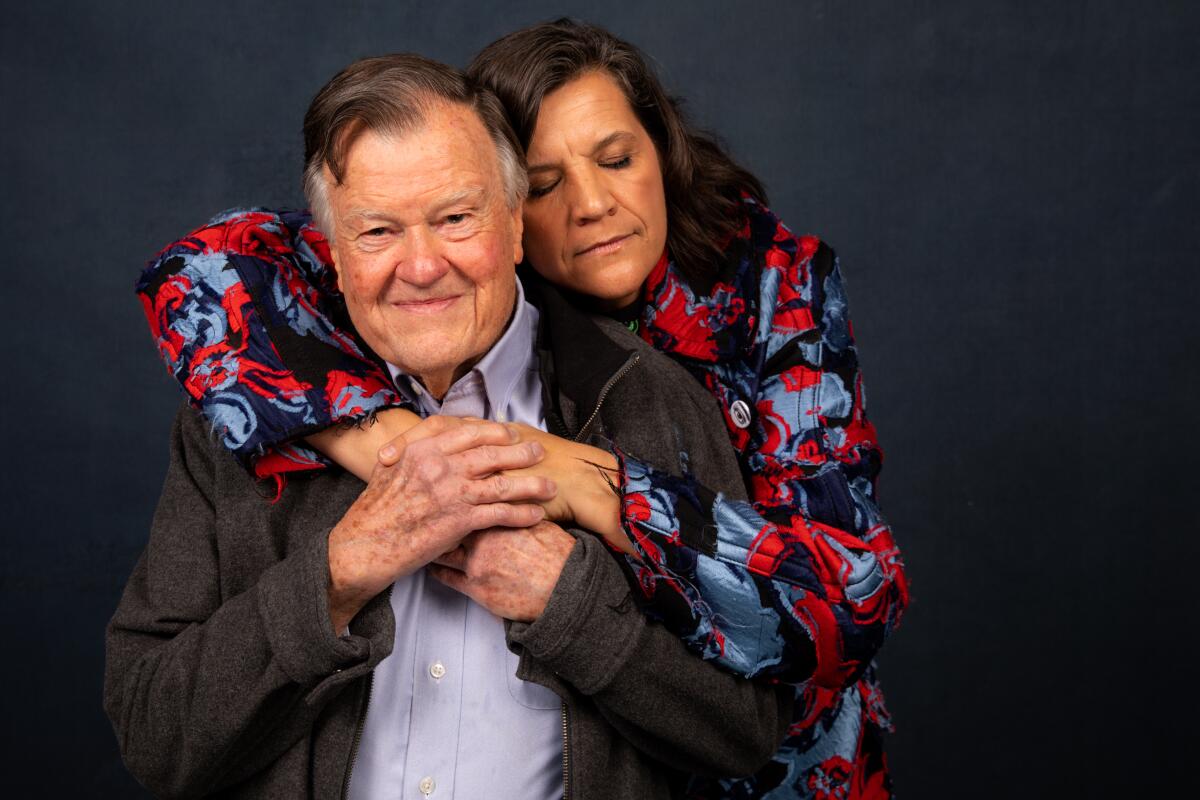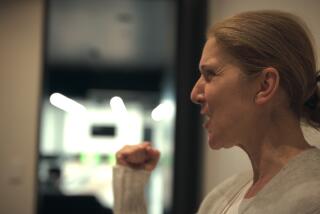âDick Johnson Is Deadâ: Filmmakerâs wildly inventive take on her fatherâs dementia

When âDick Johnson Is Deadâ premiered in January at the Sundance Film Festival, COVID-19 had not yet gripped the United States. Kirsten Johnson, who made the irreverent-yet-tender movie about her octogenarian father as he slipped into dementia, could not have predicted how the theme of mortality would take on even more tragic relevance amid a pandemic.
âWeâre now in this space of anticipatory grief on a collective level that has some of the same aspects that facing a parentâs slow decline does,â the filmmaker said. âYou can see the future coming, and you donât like the look of it.â
Rather than sink into depression or sorrow, Kirsten confronted her fatherâs inevitable fate the best way she knew how. She captured his death on film. Over and over again. And with a kind of macabre slapstick glee. Dick Johnson, a retired psychiatrist, goes cheerfully about his business as he is, by turns, crushed by a falling air conditioner, gruesomely dispatched by a wayward wood beam and stumbles down a flight of stairs â among other exits. In the filmâs most audacious scenario, he experiences his own funeral. Everything staged, of course.
If Kirsten, whose career as a globetrotting cinematographer informed her diaristic 2016 film âCameraperson,â often imbues these episodes with the surreal texture of a dream, it might be because the film was inspired by one. In it, a man she doesnât recognize lies in an open casket. âThen he sat up and said, âIâm Dick Johnson, and Iâm not dead yet,ââ she recalled. âIt was a wakeup call that gave me the idea to do his funeral for real while he was still alive.â
Such scenes play out as Kirsten takes charge of her fatherâs affairs and he moves into her Manhattan apartment, to the delight of his twin grandchildren. The domestic interludes offer glimpses of Dickâs abundant charm and kind nature. Those virtues abide against the gradual progression of his illness, which claimed the filmmakerâs mother in 2007.
âHe canât act his way out of a paper bag, but he can be,â said Kirsten, whose film streams on Netflix. âHe makes really cheesy bad jokes, but ⌠even as the dementia is eating him from the inside he is one of the best listeners I have ever met. And that people can get that through the movie is so cool to me.â
As someone who often is part of a crew, Kirsten makes it a point to expose the nuts and bolts as her team puts scenes together on a soundstage or in the streets. Process is part of the story too. âI want to make a cinema that reveals the collectivity of making films,â she explained, âand the relationship nature of it.â This practice also offers transparency to viewers who may be concerned for her fatherâs well-being. The recurring question Kirsten asked herself was âIs this OK? Is this not OK?â âThe idea was not to humiliate him but also to have a funny movie,â she said. âDementia is such a tricky disease, itâs not like you can control it.â
Her experience shooting documentaries, often in conflict zones amid unstable conditions, taught Kirsten how to improvise and make the most of unexpected situations. Those skills proved useful on set with her father.
âWe kept him in the center of things and kept imaging he had capacities, itâs just that we had to adjust to what his capacities were,â Kirsten said. âHe kept rising to the challenge.â
Dan Nuxoll, president of Rooftop Films, a New York nonprofit presenter that provided initial funding for âDick Johnson Is Deadâ in 2016, applauds Kirstenâs bravery. âItâs an ingenious but really wild, really beautiful idea,â said Nuxoll, whose organization gave the film one of its rare theatrical screenings this fall and at a Queens drive-in, no less. âThereâs a lot of documentaries that deal with Alzheimerâs and these things. The thing that really excited us is itâs a personal story, and it had this really magical element. If you donât get the tone right it can rub people the wrong way.â
And, yes, contrary to the filmâs title, Dick is still very much alive, although he is now living in a care facility. âHeâs been taking in the success of the film,â Kirsten said. âIâve been reading to him about the film. He gets it, and he doesnât get it.
âI went to visit him on his birthday, and there was a review in the New York Times, and heâs like: âWhat? The New York Times is covering birthdays now? I thought they only did obituaries?â I laughed so hard. All of our dreams are to have our obituary in the New York Times, and my dadâs like, âMy birthdayâs in the New York Times?ââ
More to Read
From the Oscars to the Emmys.
Get the Envelope newsletter for exclusive awards season coverage, behind-the-scenes stories from the Envelope podcast and columnist Glenn Whippâs must-read analysis.
You may occasionally receive promotional content from the Los Angeles Times.










